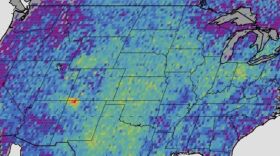President Obama and Canadian Prime Minister Justin Trudeau just announced a joint effort to cut down on methane leaks from oil and gas wells. The agreement was part of the Paris climate accord and will have impacts here in New Mexico.
Public Health New Mexico’s Ed Williams sat down with Camilla Feibelman of the Sierra Club’s Rio Grande Chapter to talk about what the rules mean for our state.
FEIBELMAN: You may have heard that New Mexico is home to the country’s largest methane spot, or cloud. It’s a cloud of methane gas hovering over the Four Corners area the size of Delaware. So by controlling for some of this methane leaking, venting and flaring, we actually might be able to reduce the size of that methane cloud.
KUNM: How much of a reduction has to happen here?
FEIBELMAN: We’re talking about, nationwide, a reduction of 40 to 45 percent. In New Mexico, so much of our oil and gas extraction happens on public lands, and when oil and gas extraction occurs on public lands, the Bureau of Land Management is in charge. They’re the ones who get to say what companies need to do in order to manage for that methane release. The exciting thing about controlling for methane is that it’s cheap and it’s job-intensive. What we’re saying is while workers are being underutilized by industry because of the glut on the world market and because of the actions of OPEC, let’s put those folks back to work installing the technology necessary to control this type of extraction.
KUNM: Let’s talk about that, because what the oil and gas industry says is, ‘These rules are expensive, and it’s going to hurt our bottom line. We have to pay our employees. We have costs to cover, and these extra rules just aren’t something we can afford.’
FEIBELMAN: Well, unfortunately, it’s the same argument that industry makes no matter what the rule is, no matter whether the economy’s doing well or not. If you look at these particular rules, they’re simple and easy rules that help industry be good neighbors. There are 11 companies in New Mexico that build the technology to handle this leakage problem. It’s job-intensive work, so during this low-price environment, it would be a really good time to put workers back to work to retrofit. Prices won’t always be low, but now would be a good time to do it.
KUNM: Methane is a greenhouse gas, as you said. It contributes to global warming, and global warming is a health issue in a big and broad sense—but I’m wondering: There are a lot of constituent chemicals that are involved in fracking and natural gas drilling, things like benzene and aromatic hydrocarbons that we know do have negative health effects. Can we expect to see any reduction in those chemicals as a result of these rules?
FEIBELMAN: Yes, these rules will have a direct benefit for health, because along with the invisible climate change-inducing gases there are also volatile organic compounds that are released at the same time. These are known to be the basis for the formation of smog, which induces asthma. In New Mexico, we’ve already got 180,000 cases of asthma. That amounts to lost days at school and work on the part of kids and parents. We have big visits to the hospital, and hospital and health bills that are paid not by the oil and gas companies but by working families.






